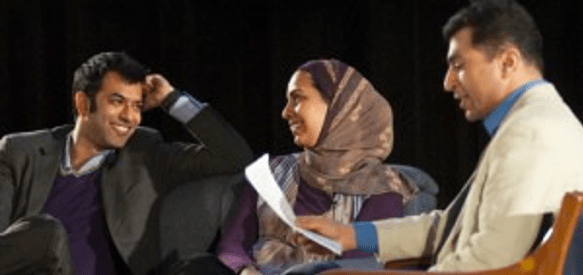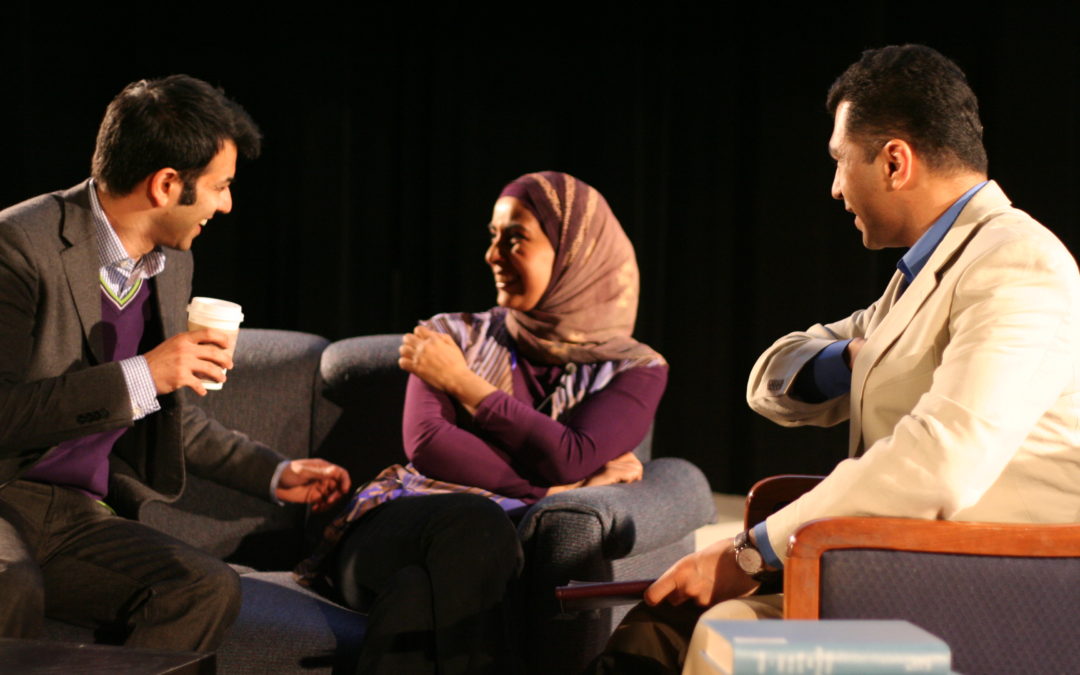UTM alumnus and actor Zaib Shaikh joins students for a discussion on Canadian pluralism last Wednesday in CCT 1080. Matthew Filipowich/The Medium

Last Wednesday, Zaib Shaikh, the lead actor from Little Mosque on the Prairie, participated in lecture discussing Canadian pluralism and Muslim identity post 9/11. Moderated by Dr. Shafique Virani, professor of Islamic Studies at U of T, the lecture was organized by the Faculty of Historical Studies and the U of T Religion in the Public Sphere.
“The Snider Lectures are an old tradition at the University of Toronto Mississauga,” said
Professor Pierre Yves Robin in the opening remark of the lecture. “They are courtesy of
Fletcher C. Snider, a graduate lawyer of the University of Toronto whose widow donated his entire estate to the trustees of the university on the condition that the money from his estate be used to fund lectures to be given by English publicists of prominence in belles letters.”
A draw for the lecture was Zarqa Nawaz, the creator of the award-winning CBC show. Nawaz and Shaikh started off their introductory speeches by thanking the professors at UTM who had a huge role in their undergraduate lives as mentors and nurtured them to pursue their passions.
Professor Shafique Virani initiated the talk by re-playing an episode from Little Mosque on the Prairie and engaged the audience in a discussion about the media.
According to Shaikh, Little Mosque on the Prairie was made after 9/11 to portray the average Muslim to the general Canadian audience. Shaikh thanked the Canadian ethos of multiculturalism that allowed the show to be aired and accepted by the Canadian Broadcasting Corporation.
Dr. Virani cited the statistics from the Harpers Magazine that 91% of articles in the British and national newspapers portray Muslims in a negative light. He also revealed that 19 out of 20 U.S. films with male Arab or Muslim characters depict them as greedy, violent or dishonest.
“The greatest platform to speak to a large group of people without the involvement of religion and politics is the arts,” said Shaikh.
According to Nawaz, the characters of the show are archetypes that one commonly sees in the Muslim and Canadian communities. Many of the program’s characters, said Nawaz, were inspired from her experiences as growing up in a Muslim neighborhood in Toronto and going to the mosque. Nawaz added that the protagonist, Babar, is a fundamentalist Imam, but his role as a single dad of a westernized and rebellious daughter attempts to humanize the character.
Similarly, the character of Rayyan, who is a doctor and a feminist figure who fights for the rights of Muslim women in the congregation, serves as a foil to Babar. Imam Ammar Rasheed, a Bay Street lawyer who found his calling as the religious leader of the Muslim community of Mercy, has a strong foundation in Islam and constantly questions and negotiates his faith while arguing with Babar.
“Writing about Islam and its relationship with other communities is not easy and one has to be careful of not upsetting certain elements of the community,” Nawaz said during the lecture. She does not write in a vacuum and receives feedback from the audience and dramatic art students, along with the help of a diverse board of writers and directors who are Christians, Muslim and other religious backgrounds.
The dynamics on Little Mosque on the Prairie appealed to Shaikh. The actor enjoys working in comedies such as Little Mosque on the Prairie, and stated that “stereotypes are pointed out and the lens you look at the world is diverse, and if you look at the world in the most extreme of condition and make fun of the stereotypes, you end up with a hilarious result.”
Towards the end of the lecture, students had the opportunity to address the stars on topics such as Islam, arts and pluralism. The guests answered inquiries on various issues, such as whether racial profiling of Muslim communities at the airport exists, or how minority groups succeed in the media industry. They also discussed potential ideas for future episodes of the show.
In his closing remarks for the evening, Shaikh said that he wanted to leave the audience with the meaning of the word “impact,” which he said is the act of one body striking another.
“What happened on September 11 allowed all of us to learn what impact meant and the impression made by various cultural movements and strong reactions from all communities,” said Shaikh.
First published by Ovais Shah on The Medium Online, February 28, 2010
Share what you’re reading on social media

